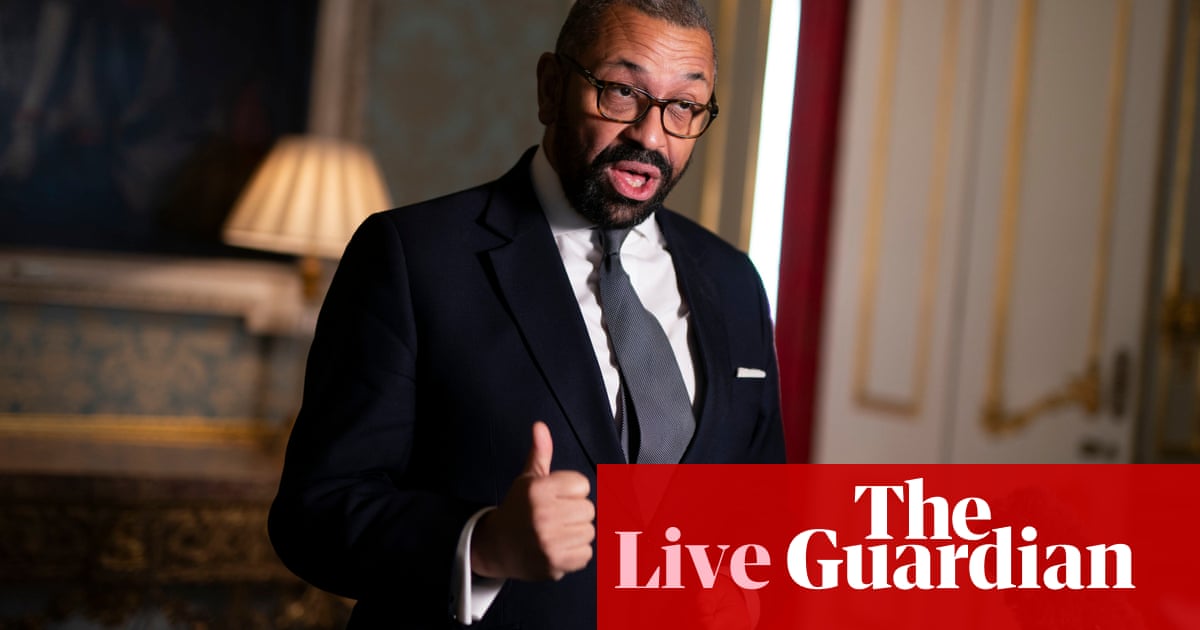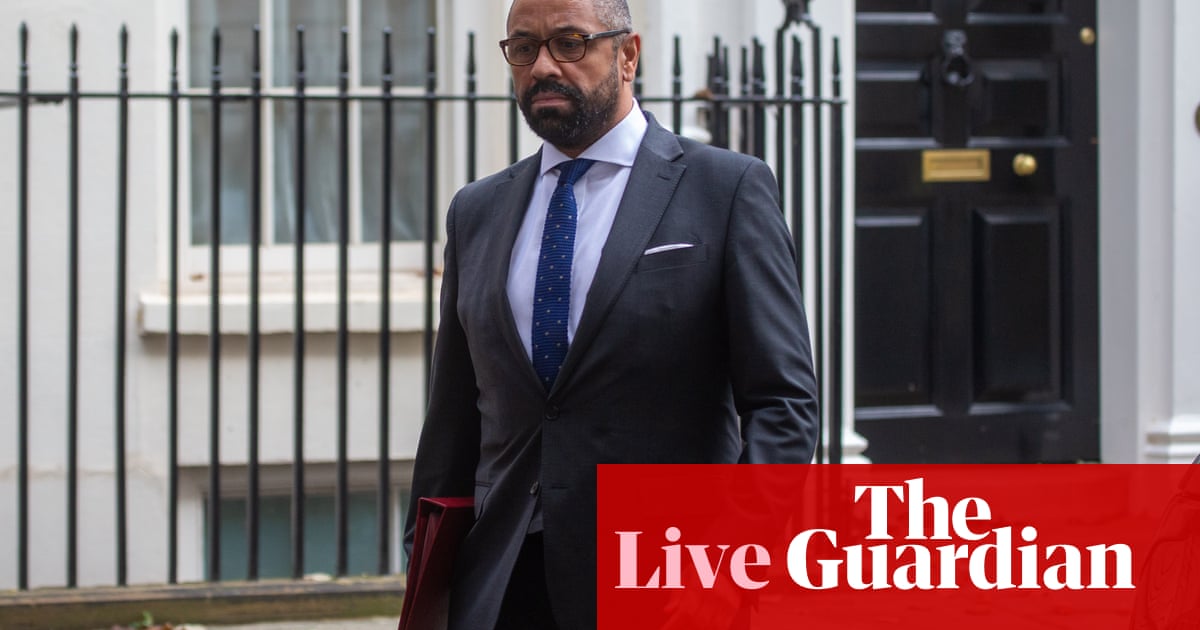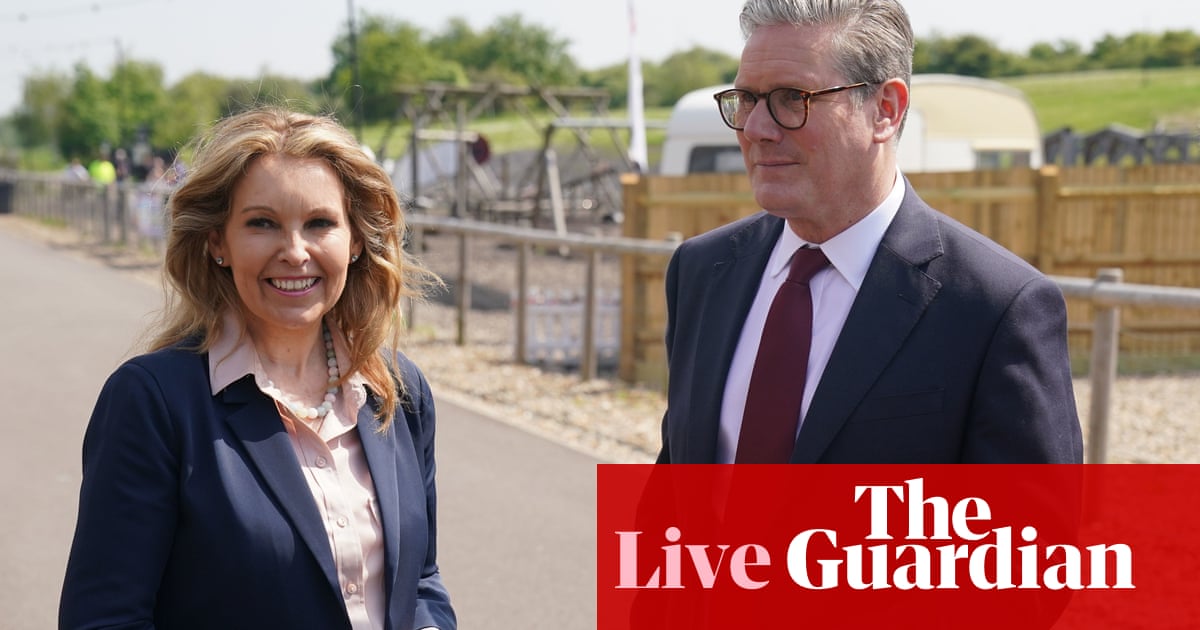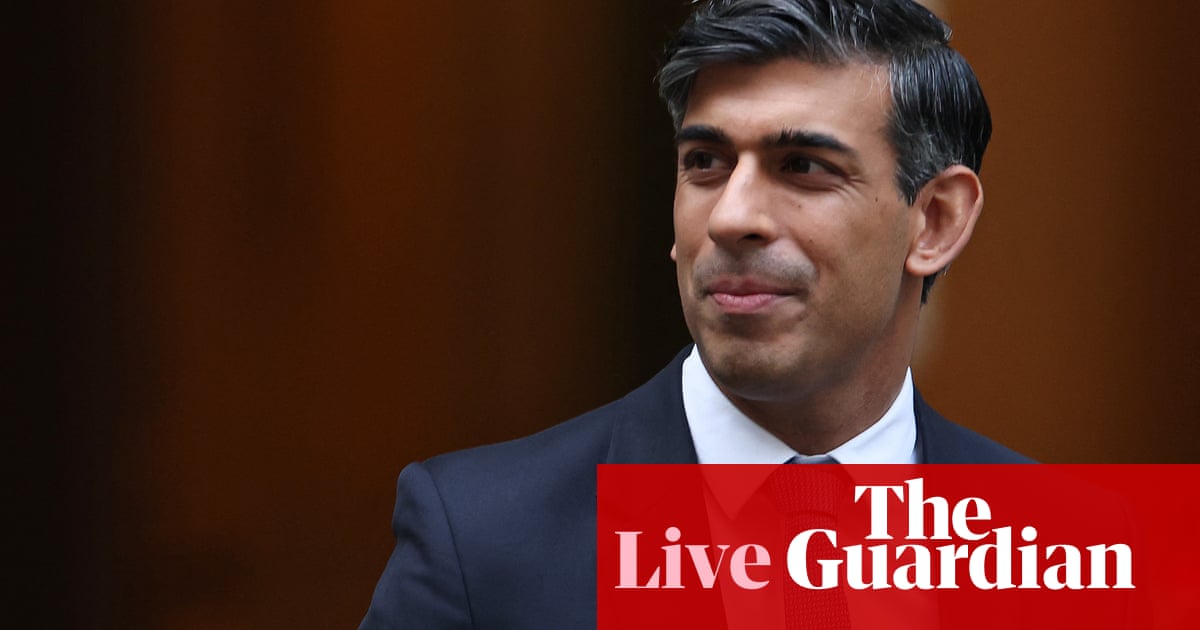
Cleverly tells MPs crackdown will cut annual immigration numbers by around 300,000
Cleverly says the public expect the government not just to stop the small boats, but to cut legal immigration too.
From January 2024 the right of international students to bring in dependants will be stopped unless they are on a postgraduate research programme, he says.
But today new measures are being announced, he says.
He claims the measures will reduce immigration by about 300,000 compared with last year’s figures.
UPDATE: Cleverly said:
From January 2024, the right for international students to bring dependants will be removed unless they are on postgraduate courses designated as a research programme. We always want to attract the global brightest and best.
We have also stopped international students from switching out of the student route into work routes before their studies have been completed. These changes will have a tangible impact on net migration.
Around 153,000 visas were granted to dependants of sponsored students in the year ending September 2023, today I can announce that we will go even further than those provisions already in place, with a five-point plan to further curb immigration abuses that will deliver the biggest ever reduction in net migration.
In total, this package, plus our reduction in students dependants will mean around 300,000 fewer people will come in future years than have come to the UK last year.
Early evening summary
James Cleverly, the home secretary, has triggered alarm in the health and care sectors by announcing sweeping plans to restrict immigration. He said the measures would cut annual immigration by 300,000 and, promoting the plans on social media, the Conservative party described this as the “biggest ever cut in net migration”.
In the Commons the proposals were welcomed by Tory MPs, many of whom have been demanding much stricter controls since the publication of figures showing net migration at a record high of 745,000 last year. Cleverly said criticism of the plan from Labour MPs showed the opposition was not serious about wanting to reduce immigration. He also dismissed claims that the plans would exacerbate worker shortages in the health and social care sectors, where employers rely on foreign staff. The impact would not be “significant”, he claimed. (See 4.45pm.) But health and care sector leaders said they were alarmed by the plans. Miriam Deakin, director of policy and strategy at NHS Providers, which represents hospitals and other NHS bodies, said:
With over 120,000 staff shortages in the NHS and over 150,000 in social care, measures that deter people from joining these professions are deeply concerning.
The NHS Long Term Workforce Plan is clear that international recruitment will continue to play a key role in the NHS’s future, alongside domestic training.
We therefore need the health and care sectors to remain attractive not only to domestic workers but also to those educated internationally.
Caroline Abrahams, a director at Age UK and co-chair of the Care and Support Alliance, which represents more than 60 charities, said:
We are worried that older and disabled people in need of care, and their families, will pay a heavy price for the government’s changes to the migration rules from next Spring. It is an open secret that inward migration effectively ‘saved’ the social care workforce last year and, as things stand, anything that undermines that source of support must be a real concern. Too many people in need struggle to access good care as it is, and the risk is that today’s announcement will make the situation worse.
And Prof Nicola Ranger, chief nurse at the Royal College of Nursing, said:
Ministers appear comfortable with tearing apart families to score political points. This cruel sanction will deter care workers from coming to the UK, adding to dire workforce shortages in social care and ultimately piling even more pressure on an overburdened NHS. The home secretary admitted in his own announcement in the Commons that health workers with families will be put off joining our short-staffed health and care services.
A Labour government must shed the assumption that public spending is “the only lever that can ever be pulled” to improve people’s lives, Keir Starmer has said, as he refused to rule out keeping planned cuts to government departments if he won power.
Jeremy Hunt has blamed Brexit for more than half a decade of political instability that has undermined business investment in the UK, as he sought to defend tax cuts paid for by public sector austerity to drive up economic growth.
The UK’s return to the EU’s flagship Horizon science research programme was formally signed off in Brussels today by the science and innovation secretary, Michelle Donelan, and her European counterpart, Iliana Ivanova.
“Watch this space because we are expecting this to be incredibly useful tool with some exciting times ahead,” said Donelan.
The return ends a two-year absence from the £85bn programme in a tit-for-tat row over the Brexit trading arrangements in Northern Ireland.
Despite the UK government threatening for years to boycott Horizon and go it alone, today Donelan was brimming with enthusiasm for the programme. She said:
I just think that we as a nation in the UK need to be really ambitious and seize this opportunity. And, and that’s why we are, as a department, really going to invest the time and the energy to try and make sure that our participation punches above its weight. This is, as I said before, something that the sector actively lobbied for. So we’ve got no concerns about that. But we really want to maximise this opportunity.
Among the initiatives is a campaign to attract people who have never engaged with Horizon before with £10,000 in “pump priming” funding available to first timers, she announced.
This is from Stuart Hoddinott, a researcher at the Institute for Government thinktank, on the immigration crackdown.
Starmer is "running late" in requesting talks with civil service about implementing Labour"s policies, IfG thinktank warns
Keir Starmer’s Labour party is running late in seeking formal talks with senior civil servants ahead of the next general election, a thinktank has warned.
The Institute for Government (IfG) urged Labour to request the process “as soon as possible” or risk seeing their policies delayed if they were to win.
Emma Norris, deputy director of the IfG, suggested Labour’s delay at requesting the talks could mean the party is unsure on what it wants to offer the country.
Usually, transition access talks start around 16 months before the end of parliament in the run-up to a predictable election.
Before the 1997 election, Tony Blair’s team came in with “big plans” for the minimum wage, Bank of England independence and devolution “quite ready to go on day one”. Starmer’s office is understood to be not planning to request the access talks until the new year at the earliest.
Norris warned the party would not be able to “move fast enough” with its priorities and could fall into some of the “bear traps” of poorly thought-through policy.
“Labour has its five missions prepared and lots of smaller policies but they haven’t gone far enough on prioritising meaty policies that will sit under the missions,” Norris told reporters.
The IfG also urged Labour not to make any more reshuffles ahead of the next election, to maintain a level of policy experience.
“Even if the election happens at the last possible moment, they’re running late,” Norris said.
Christopher Hope from GB News says, even with the new measures, the government will not cut immigration to the level promised in the 2019 manifesto.
SNP says government"s immigration crackdown will harm NHS in Scotland
The SNP says the immigration controls will be bad for Scotland. Chris Stephens MP, the party’s immigration spokesperson, said:
It is clear that the biggest threat to Scotland’s NHS is Westminster control. Scotland is already suffering from labour shortages as a result of Westminster’s Brexit and migration policy – particularly within our public services – and the steps set out today will further hamper our ability to recruit from overseas.
Both the Tories and Labour are wedded to this flawed plan along with the privatisation of our NHS. Just yesterday Sir Keir Starmer praised Margaret Thatcher – the architect of NHS privatisation – of delivering “meaningful change” to the UK.
Scotland’s NHS is not safe under Westminster control no matter the colour of its government. Independence is the only way we can get rid of Westminster governments we don’t vote for for good and create an immigration system that meets the needs of Scotland’s public services.
In Scotland the public debate about immigration is quite different from in the rest of Britain because Scotland’s population is projected to fall over the long term. The SNP says that shows why Scotland needs higher immigration, and it has repeatedly called for border policy to be devolved to Edinburgh.
Neil O’Brien (Con) asks Cleverly if he will publish the analysis that led him to claim that these measures would reduce immigration by 300,000.
Cleverly says he is happy to put these figures in the House of Commons library (which, in practice, means making them public).
Unison accuses government of "playing roulette with essential services" to placate Tory MPs and far right
Echoing what she said on the World at One earlier (see 1.39pm), Christina McAnea, the general secretary of Unison, which represents many care workers, has put out a statement describing the Cleverly proposals as a “total disaster for the NHS and social care”. She said:
These cruel plans spell total disaster for the NHS and social care. They benefit no one.
Migrant workers were encouraged to come here because both sectors are critically short of staff. Hospitals and care homes simply couldn’t function without them.
There’s also a global shortage of healthcare staff. Migrants will now head to more welcoming countries, rather than be forced to live without their families.
The government is playing roulette with essential services just to placate its backbenchers and the far right. But if ministers stopped ducking the difficult issues, and reformed social care as they’ve long promised, there wouldn’t be such a shortage of workers.
None of this is rocket science. Fund care properly and raise wages, and the sector becomes a more attractive place to work. But take away the migrant workers currently stopping care from going under and it collapses.
Colin Yeo, a barrister specialising in immigration, says the decision to raise the minimum income for family visas to £38,700 (see 4.47pm) will make it impossible for some Britons to bring foreign spouses to the UK.
Many British citizens will be unable to live legally in the UK with their spouses. This is twice the national minimum wage. A lot of people simply cannot afford it, no matter how hard they work.
This is an absolute scandal yet the headlines are currently focused on care visas! I’m sorry, but migrant workers can choose not to come. This impacts British citizens and their families, who have no choice about who they fall in love with. It’s FAR more important.
Cleverly says all the Labour MPs asking questions are opposing the proposals he has just announced, even though Yvette Cooper, the shadow home secretary, says Labour is in favour of controlling immigration.
Neil Coyle (Lab) says this is another example of the government’s economic future being in the hands of Tory headbangers.












